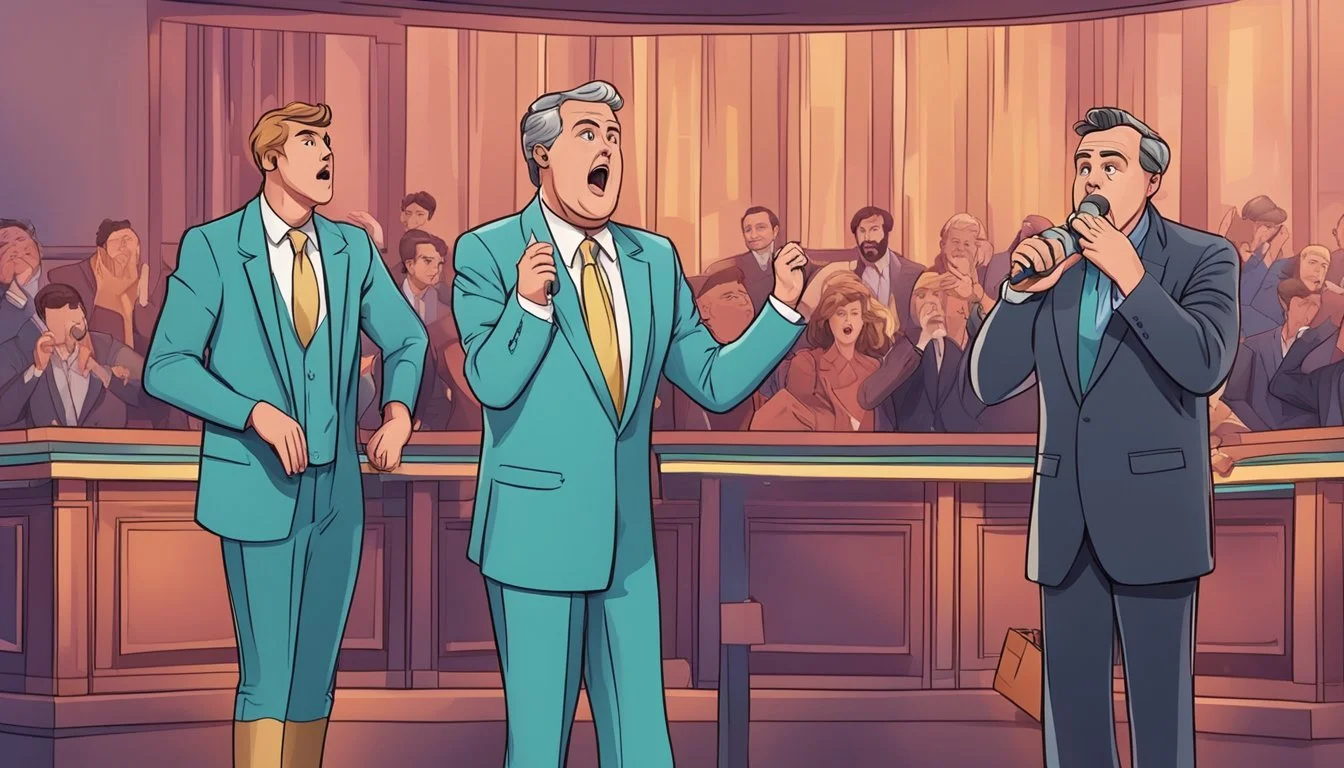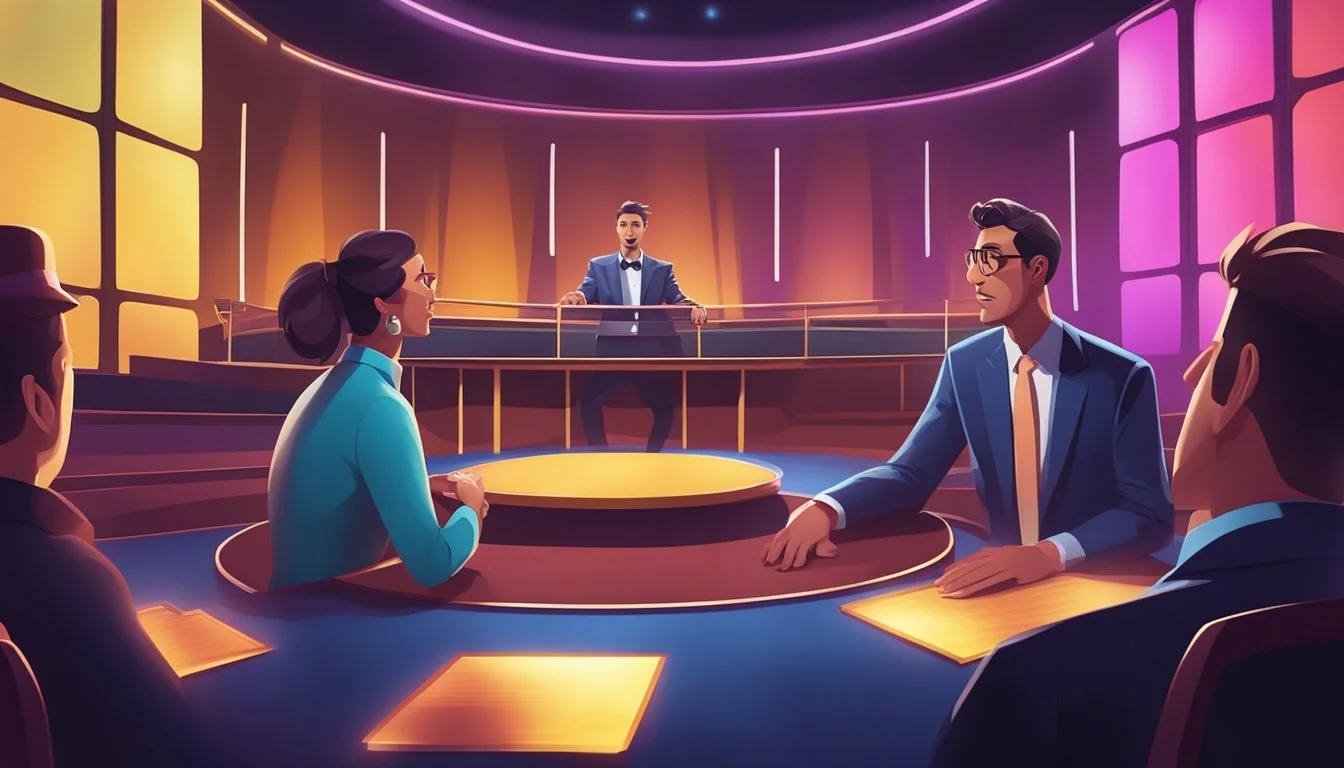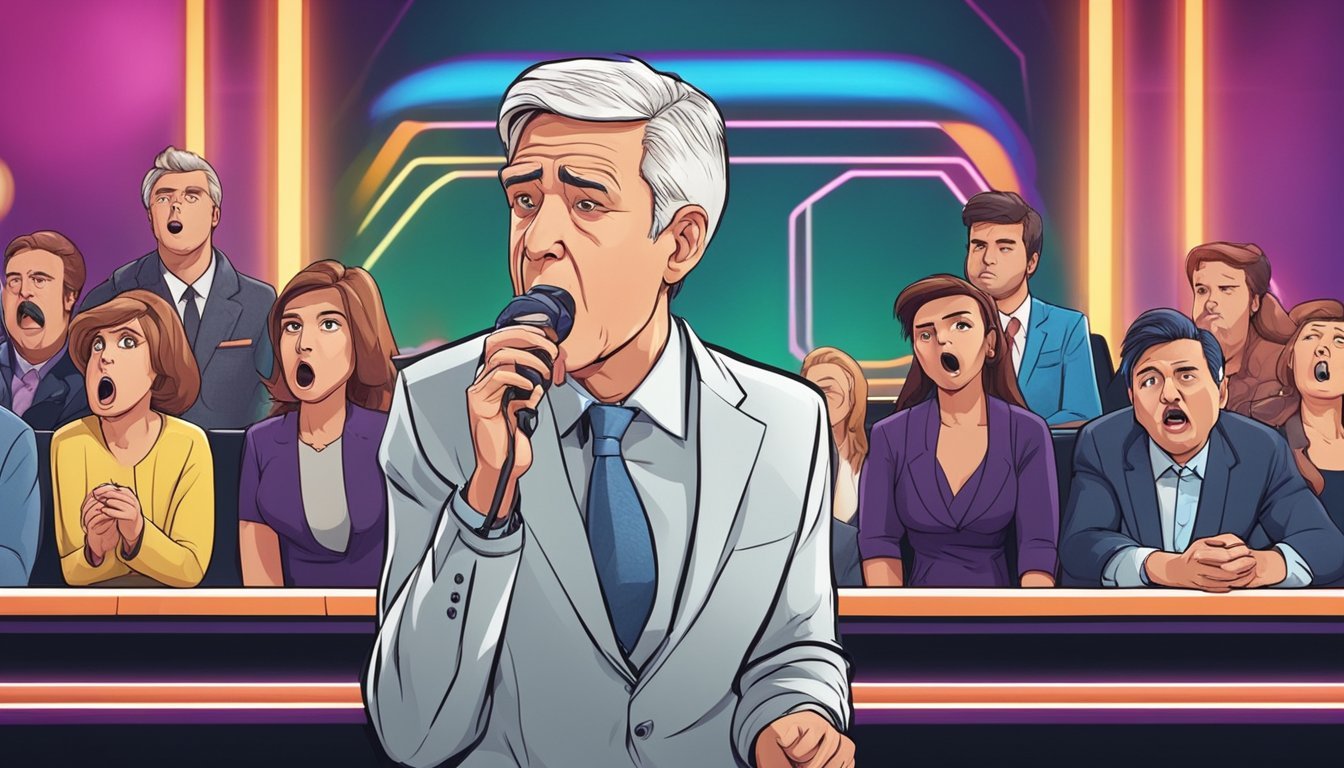Quiz: The Coughing Major Scandal That Rocked 'Who Wants to Be a Millionaire?
Revisiting TV's Biggest Cheating Controversy
In 2001, a seemingly ordinary episode of "Who Wants to Be a Millionaire?" turned into one of the most infamous scandals in British television history. Charles Ingram, a former British Army major, stood accused of cheating his way to the £1 million prize through an elaborate coughing scheme. The scandal involved Ingram, his wife Diana, and an alleged accomplice who coughed to signal correct answers during the high-stakes quiz show.
The incident captured public attention and sparked intense debate about the integrity of game shows. Ingram, dubbed "The Coughing Major" by the media, faced not only legal consequences but also widespread ridicule. The couple was convicted of deception, fined, and ordered to pay substantial costs.
This scandal has since become a cultural touchstone, inspiring dramatic retellings and continued fascination. It exposed the vulnerabilities of quiz show formats and challenged perceptions of social mobility in the UK. The story of the Coughing Major remains a compelling tale of ambition, deception, and the high-pressure world of televised competitions.
Origin of the Coughing Major Scandal
The Coughing Major scandal erupted in September 2001 on the popular British game show "Who Wants to Be a Millionaire?". Charles Ingram, a British Army major, appeared as a contestant and won the top prize of £1 million.
Ingram's victory quickly came under scrutiny. Producers noticed suspicious patterns of coughing from the audience during his appearance. These coughs seemed to coincide with correct answers being read aloud.
Investigations revealed an alleged conspiracy involving Ingram, his wife Diana, and a fellow contestant named Tecwen Whittock. The trio was accused of using the coughs as signals to indicate correct answers.
The scandal gained massive media attention. It shocked viewers and raised questions about the integrity of one of Britain's most popular television shows.
Ingram's win was voided, and he was never paid the million-pound prize. The case went to trial, resulting in convictions for all three individuals involved in the scheme.
This incident became known as the "Coughing Major" scandal, forever changing the legacy of "Who Wants to Be a Millionaire?" in British pop culture.
Key Figures Involved
The "Coughing Major" scandal revolved around four central individuals who played pivotal roles in the controversial Who Wants to Be a Millionaire? episode and its aftermath.
Charles Ingram
Charles Ingram, a former British Army major, became the central figure in the scandal. He appeared on Who Wants to Be a Millionaire? in September 2001, winning the £1 million top prize. Born in 1963, Ingram had a distinguished military career before his game show appearance.
His performance raised suspicions due to his erratic behavior and seemingly improbable answers. Ingram changed his responses multiple times, often settling on correct answers after initially expressing uncertainty.
The subsequent investigation and trial focused on allegations that Ingram had cheated with the help of strategically timed coughs from an accomplice in the audience.
Diana Ingram
Diana Ingram, Charles's wife, played a significant role in the events surrounding the scandal. She had previously appeared on Who Wants to Be a Millionaire? herself, winning £32,000.
Diana was present in the audience during Charles's winning performance. The prosecution later alleged that she was involved in coordinating the cheating scheme.
Her actions before and during the show, including her interactions with Tecwen Whittock, came under scrutiny during the investigation and trial.
Tecwen Whittock
Tecwen Whittock, a college lecturer, sat in the audience during Charles Ingram's winning episode. He became a key figure in the cheating allegations.
Prosecutors claimed Whittock used a series of coded coughs to signal correct answers to Ingram. Audio analysis of the show's recording revealed suspicious patterns of coughing coinciding with correct answers.
Whittock maintained his innocence, attributing his coughing to a persistent throat condition. Despite his explanations, he was found guilty alongside the Ingrams.
Chris Tarrant
Chris Tarrant, the charismatic host of Who Wants to Be a Millionaire?, unknowingly presided over the controversial episode. He initially had no suspicions about Ingram's win.
Tarrant congratulated Ingram on his victory and presented him with the £1 million check. However, his perspective changed after reviewing the episode and hearing about the cheating allegations.
During the trial, Tarrant testified about his observations and interactions with Charles Ingram during the show. His testimony provided crucial insights into the atmosphere and events of that fateful episode.
The Infamous Game Episode
Charles Ingram's appearance on "Who Wants to Be a Millionaire?" in September 2001 became a defining moment in British television history. The Army major progressed through the questions with apparent ease, eventually claiming the £1 million top prize.
Ingram's success initially seemed remarkable. He used lifelines strategically, including the "Ask the Audience" option. His performance in the "Fastest Finger First" round had secured his place in the hot seat.
As the game unfolded, suspicions arose. Attentive viewers and production staff noticed a pattern of coughs from the audience. These coughs seemed to coincide with Ingram's selection of correct answers.
The major's behavior during the episode was also notable. He frequently changed his mind about answers, sometimes after hearing coughs. This erratic decision-making contrasted with his confident final choices.
Producers became increasingly wary as the game progressed. They allowed Ingram to complete the show and claim his prize. However, investigations began immediately after the recording.
The episode never aired in its original form. Instead, it became central evidence in a criminal investigation and subsequent trial. The coughs, Ingram's reactions, and the improbable nature of his win all came under intense scrutiny.
Investigation and Trial
The alleged cheating on "Who Wants to Be a Millionaire?" sparked a thorough investigation. Producers and network executives carefully reviewed the episode's footage and audio recordings.
Suspicions arose due to an unusual pattern of coughing from the audience during Major Charles Ingram's winning performance. This led to accusations of a coordinated coughing scheme to signal correct answers.
In 2003, Charles Ingram, his wife Diana, and fellow contestant Tecwen Whittock faced trial at Southwark Crown Court. They were charged with procuring the execution of a valuable security by deception.
The prosecution presented evidence of the coughing pattern and claimed it aligned with the correct answers. Defense lawyers argued the coughs were coincidental and questioned the reliability of the audio analysis.
After a four-week trial, the jury found all three defendants guilty. The Ingrams and Whittock received suspended prison sentences and hefty fines.
Despite the verdict, debates about their innocence have persisted. Some journalists and researchers have challenged the strength of the evidence, keeping the case in the public eye.
The trial and its aftermath significantly impacted the lives of those involved. It also led to increased security measures on quiz shows to prevent potential cheating attempts.
Public Reaction and Media Coverage
The "Coughing Major" scandal captivated the British public and dominated media headlines. News outlets across the country ran extensive coverage of the alleged cheating incident on "Who Wants to Be a Millionaire?"
Public opinion was divided. Some viewers expressed outrage at the perceived deception, while others sympathized with the Ingrams. Social media platforms buzzed with discussions and debates about the case.
Television documentaries and news programs delved into the details of the scandal. Martin Bashir, a prominent journalist at the time, conducted high-profile interviews with key figures involved in the controversy.
The media scrutiny intensified as the case went to trial. Courtroom proceedings were widely reported, with newspapers publishing daily updates on the testimonies and evidence presented.
Tabloids ran sensationalized stories, often focusing on the personal lives of Charles and Diana Ingram. This led to increased public interest but also raised questions about media ethics and fair reporting.
The scandal's impact extended beyond the UK, garnering international attention. News outlets worldwide covered the story, further amplifying its reach and significance.
Public fascination with the case persisted long after the trial concluded. The incident became a cultural touchstone, frequently referenced in popular media and discussions about game show integrity.
Representation in Popular Culture
The "Coughing Major" scandal captivated audiences and inspired creative works exploring the controversial events. Two notable adaptations brought the story to life for new generations.
James Graham's 'Quiz'
James Graham adapted his stage play into a three-part ITV drama miniseries titled "Quiz" in 2020. The show starred Matthew Macfadyen as Charles Ingram, Sian Clifford as Diana Ingram, and Michael Sheen as Chris Tarrant. It delved into the scandal's complexities, presenting both the prosecution and defense perspectives.
The miniseries explored the Ingrams' background, their alleged cheating scheme, and the subsequent trial. Graham's adaptation aimed to challenge viewers' preconceptions about the case, encouraging them to question the accepted narrative.
'Bad Show' by Bob Woffinden and James Plaskett
"Bad Show: The Quiz, the Cough, the Millionaire Major" offered a different take on the scandal. Published in 2015, the book presented an alternative view of the events, suggesting the possibility of the Ingrams' innocence.
Woffinden and Plaskett's work examined the evidence in detail, questioning the prosecution's case. Their investigation raised doubts about the fairness of the trial and the media's role in shaping public opinion.
The book provided a counterpoint to the prevailing narrative, sparking renewed interest in the case and influencing subsequent adaptations.
Aftermath and Legacy
The "Coughing Major" scandal left an indelible mark on British television history. Major Charles Ingram, his wife Diana, and accomplice Tecwen Whittock were convicted of cheating in 2003. They received suspended prison sentences and substantial fines.
The incident sparked widespread public debate about game show integrity and security measures. "Who Wants to Be a Millionaire?" implemented stricter contestant vetting processes and enhanced studio monitoring in response.
Charles Ingram was forced to resign his army commission, ending his military career. The couple faced financial difficulties and public scrutiny for years following the scandal.
Some supporters continued to question the Ingrams' guilt, leading to ongoing discussions about the case's complexities. Books, documentaries, and dramatizations explored different perspectives on the events.
The scandal's cultural impact remained significant:
Nicknamed "the Coughing Major"
Referenced in comedy shows and popular culture
Subject of the 2020 TV drama series "Quiz"
The case raised questions about the nature of cheating, the reliability of evidence, and the role of media in shaping public opinion. It continues to fascinate audiences and provoke discussions about truth, justice, and the allure of instant wealth.
Contemporary Perspectives and Debates
The Ingram scandal continues to spark discussions about truth, innocence, and the nature of cheating in quiz shows. Some argue that the coughing strategy was too unreliable to be an effective method of cheating.
Others contend that the prosecution's evidence was circumstantial and that the Ingrams may have been unfairly convicted. This view gained traction after the 2020 drama series "Quiz" presented a more sympathetic portrayal of the couple.
The case has also prompted debates about class bias in British media and society. Critics argue that the Ingrams' upper-middle-class background influenced public perception and media coverage of the scandal.
Technological advancements have led to questions about the fairness of older quiz show formats. Some suggest that modern security measures could prevent similar incidents and ensure the integrity of game shows.
The enduring fascination with the "coughing major" story reflects broader cultural interests in true crime narratives and scandals involving seemingly ordinary people. It continues to captivate audiences and generate discussions about honesty, justice, and the allure of instant wealth.






